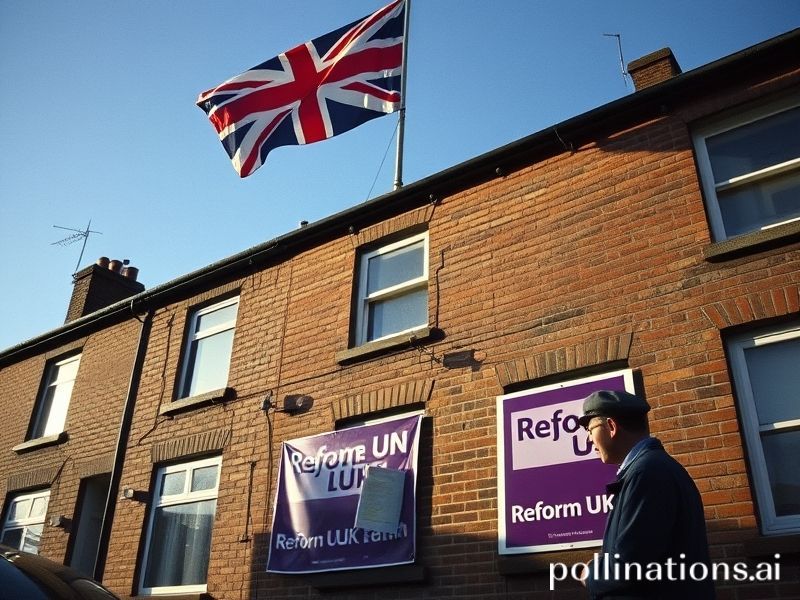Reform UK: How Britain Exported Its Midlife Crisis to the World
**Reform UK: Britain’s Latest Political Hobby Horse Rides Again**
By the time the rest of the planet had digested the news that the United Kingdom had coughed up yet another right-wing pressure valve calling itself a party, the pound had already shrugged, Brussels had yawned, and the bookmakers had shortened the odds on “Who cares?” to evens. Enter Reform UK, Nigel Farage’s political boomerang, back for another swing at the Westminster piñata—because apparently the lesson of Icarus was only about altitude, not repetition.
From Tokyo trading floors to Texas barbecue pits, the global reaction has been a collective adjustment of spectacles followed by the question: “Didn’t you lot already Brexit?” Yes, dear reader, but nostalgia is a hell of a drug, and nothing sells in Britain like reruns—especially when the cliffhanger is “Will we actually leave the planet this time?” Reform UK promises to finish the job, though no one can quite specify which job: the one that evaporated 2 % of GDP, the one that swapped Polish plumbers for Rwandan deportees, or the entirely new one involving “digital border technology” that sounds suspiciously like a QR code stapled to the white cliffs of Dover.
Internationally, the party’s resurrection matters less for what it is than for what it signals: the final monetisation of perpetual grievance. Populist franchises from São Paulo to Stockholm have taken notes. Why bother governing when you can livestream outrage? Reform’s donor list now reads like a Cayman mailing circle—half hedge-fund buccaneers hedging against sterling collapse, half crypto barons who think a seat in Parliament is an NFT with expenses. If you’re a developing-world autocrat, the spectacle is delicious: the former empire dismantling itself for content, PayPal-ing donations in real time while accusing everyone else of corruption.
The policy menu is comfort food for the chronically furious: freeze net-zero, torch the BBC, and float the idea of a “British Bill of Rights,” presumably scrawled on the back of an Australian points-based visa. Climate scientists in Bonn quietly add another 0.1 °C to every model; not because Reform will win, but because it forces the Tories to adopt their slides to stay relevant. In the geopolitical classroom, that’s called “negative policy diffusion”—think of it as intellectual second-hand smoke, except the planet gets the tumour.
Meanwhile, the diplomatic corps in London practise their neutral faces. American envoys, fresh from grooming their own insurrection bouquet, offer bipartisan thoughts like “We respect the democratic choices of the British people,” which is State-Department-ese for “Good luck with that, cousin.” The EU, still traumatised by seven years of divorce proceedings, has placed the UK file next to the one labelled “Cats That Learned to Open Doors—Do Not Re-engage.” Brussels’ worst fear is not a Reform breakthrough but a hung parliament where Farage holds the balance of power, turning every trade deal into a hostage video.
For emerging economies, Reform’s rhetoric is a masterclass in self-sabotage luxury goods. Ghanaian officials watch Westminster debates the way teenagers binge-watch trust-fund burnouts on reality TV: horrified, fascinated, taking notes on what not to do with sovereignty. When a British MP proclaims that “Global Britain” will source all its cod from Hull rather than Iceland, Vietnamese fisheries ministers quietly order another dozen patrol boats—someone’s going to fill the vacuum, and it might as well be whoever still believes in exports.
And yet, the circus is profitable. GB News ratings spike every time Farage lights a cigarette of indignation; Twitter’s ad algorithm identifies “Reform” as the new crypto, pumping nationalist vitamins to the over-fifties. Even the bookies win: Paddy Power once paid out on a bet that Britain would hold an EU referendum before 2020; they’re now offering odds on “Reform UK to rebrand again before 2027,” market-tested under the working title “Re-Reform UK: This Time It’s Personal (Data).”
In the end, Reform UK is less a political party than a perpetual Kickstarter for nostalgia—an open-source tantrum that exports the blueprint for democratic self-harm. The world watches, half-horrified, half-jealous: horrified because Britain still owns a seat at every table that matters, jealous because most countries must suppress their fringe movements; the UK monetises them. If the 20th century taught us anything, it’s that when Britain sneezes, someone else catches cold. So stock up on tissues, keep an eye on your own populists, and remember: the empire that once ruled the waves now specialises in waving the rules—one donor, one soundbite, one last pint of warm ale before closing time.







